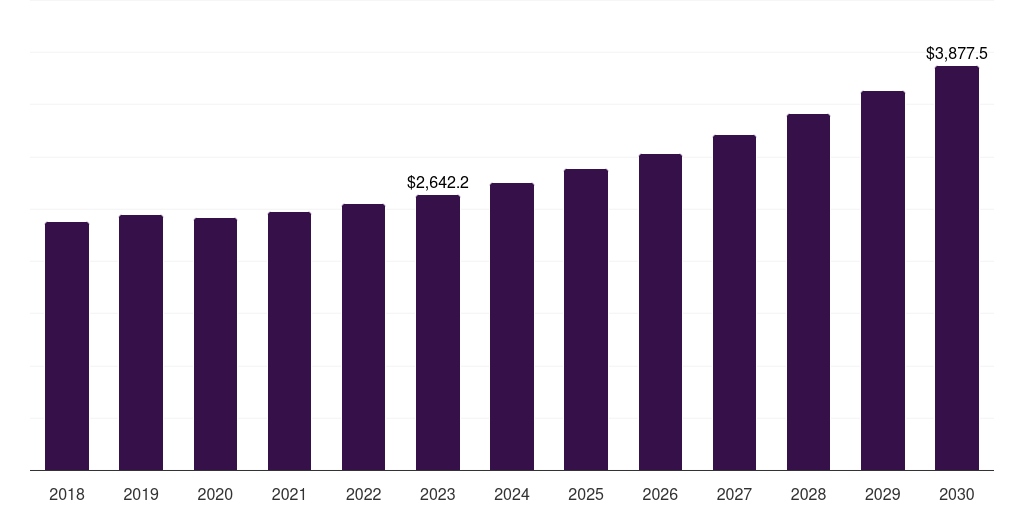Japan Automotive Plastics Market Size & Outlook, 2023-2030
Japan automotive plastics market, 2018-2030 (US$M)

Related Markets
Japan automotive plastics market highlights
- The Japan automotive plastics market generated a revenue of USD 2,642.2 million in 2023 and is expected to reach USD 3,877.5 million by 2030.
- The Japan market is expected to grow at a CAGR of 5.6% from 2024 to 2030.
- In terms of segment, polypropylene (pp) was the largest revenue generating product in 2023.
- Polyvinyl Chloride (PVC) is the most lucrative product segment registering the fastest growth during the forecast period.
Automotive plastics market data book summary
| Market revenue in 2023 | USD 2,642.2 million |
| Market revenue in 2030 | USD 3,877.5 million |
| Growth rate | 5.6% (CAGR from 2023 to 2030) |
| Largest segment | Polypropylene (pp) |
| Fastest growing segment | Polyvinyl Chloride (PVC) |
| Historical data | 2018 - 2022 |
| Base year | 2023 |
| Forecast period | 2024 - 2030 |
| Quantitative units | Revenue in USD million |
| Market segmentation | Acrylonitrile Butadiene Styrene (ABS), Polypropylene (PP), Polyurethane (PU), Polyvinyl Chloride (PVC), Polyethylene (PE), Polycarbonate (PC), Polymethyl Methacrylate (PMMA), Polyamide (PA) |
| Key market players worldwide | Akzo Nobel NV, Basf SE, Covestro AG, Evonik Industries AG, Adient PLC, Magna International Inc, Momentive, SABIC, Dow Inc, Hanwha, Grupo Antolin, Lear Corporation, Owens-Corning Inc, Quadrant Group, Koninklijke DSM NV, Teijin Ltd |
Other key industry trends
- In terms of revenue, Japan accounted for 8.7% of the global automotive plastics market in 2023.
- Country-wise, China is expected to lead the global market in terms of revenue in 2030.
- In Asia Pacific, China automotive plastics market is projected to lead the regional market in terms of revenue in 2030.
- India is the fastest growing regional market in Asia Pacific and is projected to reach USD 2,389.4 million by 2030.
No credit card required*
Horizon in a snapshot
- 30K+ Global Market Reports
- 120K+ Country Reports
- 1.2M+ Market Statistics
- 200K+ Company Profiles
- Industry insights and more
Automotive Plastics Market Scope
Automotive Plastics Market Companies
| Name | Profile | # Employees | HQ | Website |
|---|
Japan automotive plastics market outlook
The databook is designed to serve as a comprehensive guide to navigating this sector. The databook focuses on market statistics denoted in the form of revenue and y-o-y growth and CAGR across the globe and regions. A detailed competitive and opportunity analyses related to automotive plastics market will help companies and investors design strategic landscapes.
Polypropylene (pp) was the largest segment with a revenue share of 32.42% in 2023. Horizon Databook has segmented the Japan automotive plastics market based on acrylonitrile butadiene styrene (abs), polypropylene (pp), polyurethane (pu), polyvinyl chloride (pvc), polyethylene (pe), polycarbonate (pc), polymethyl methacrylate (pmma), polyamide (pa) covering the revenue growth of each sub-segment from 2018 to 2030.
Automotive manufacturing is one of the largest manufacturing sectors in Japan. The rising production of automobiles in the country is majorly fueling the demand for automotive plastics.
Automotive plastics are widely used in various applications such as powertrains, electronic components, interior furnishings, and chassis as they are highly durable, stable, flexible, corrosion resistant, scratch resistant, lightweight, and exhibit inherent barrier properties as compared to other conventional materials.
The surge in the sales of electric vehicles (EVs) in Japan can be attributed to the increasing popularity of highly affordable kei minicars. These compact and budget-friendly vehicles have gained preference among consumers, thereby contributing significantly to the overall growth of EV market.
Reasons to subscribe to Japan automotive plastics market databook:
-
Access to comprehensive data: Horizon Databook provides over 1 million market statistics and 20,000+ reports, offering extensive coverage across various industries and regions.
-
Informed decision making: Subscribers gain insights into market trends, customer preferences, and competitor strategies, empowering informed business decisions.
-
Cost-Effective solution: It's recognized as the world's most cost-effective market research database, offering high ROI through its vast repository of data and reports.
-
Customizable reports: Tailored reports and analytics allow companies to drill down into specific markets, demographics, or product segments, adapting to unique business needs.
-
Strategic advantage: By staying updated with the latest market intelligence, companies can stay ahead of competitors, anticipate industry shifts, and capitalize on emerging opportunities.
Target buyers of Japan automotive plastics market databook
-
Our clientele includes a mix of automotive plastics market companies, investment firms, advisory firms & academic institutions.
-
30% of our revenue is generated working with investment firms and helping them identify viable opportunity areas.
-
Approximately 65% of our revenue is generated working with competitive intelligence & market intelligence teams of market participants (manufacturers, service providers, etc.).
-
The rest of the revenue is generated working with academic and research not-for-profit institutes. We do our bit of pro-bono by working with these institutions at subsidized rates.
Horizon Databook provides a detailed overview of country-level data and insights on the Japan automotive plastics market , including forecasts for subscribers. This country databook contains high-level insights into Japan automotive plastics market from 2018 to 2030, including revenue numbers, major trends, and company profiles.
Partial client list
Japan automotive plastics market size, by product, 2018-2030 (US$M)
Japan Automotive Plastics Market Outlook Share, 2023 & 2030 (US$M)
Related regional statistics
Sign up - it's easy, and free!
Sign up and get instant basic access to databook, upgrade
when ready, or enjoy our
free plan indefinitely.
Included in Horizon account
- 30K+ Global Market Reports
- 120K+ Country Reports
- 1.2M+ Market Statistics
- 200K+ Company Profiles
- Industry insights and more



